Newsletter 781
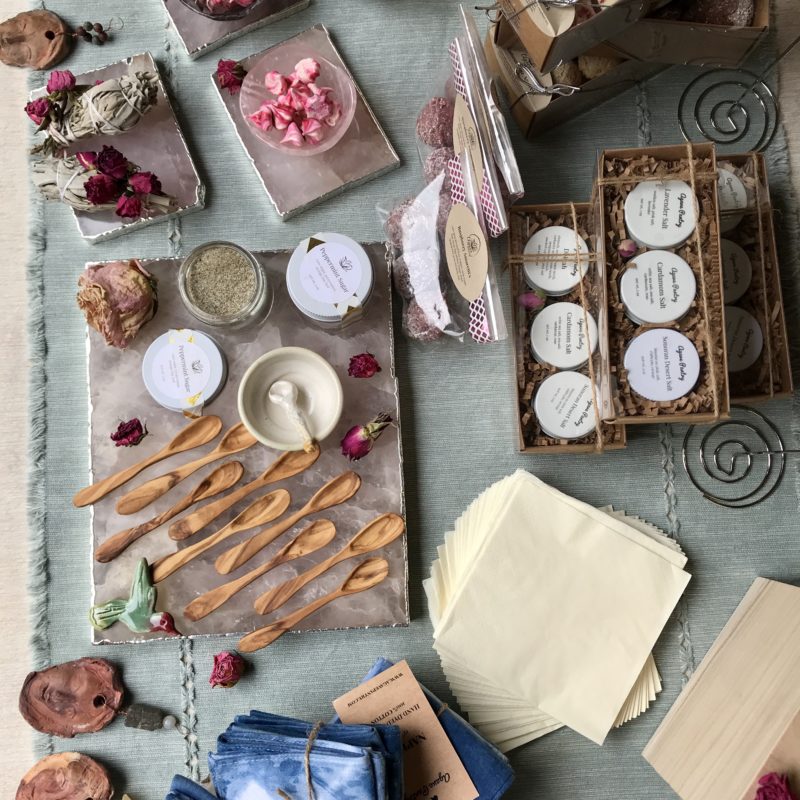
Agave Pantry – Hand-crafted caramels
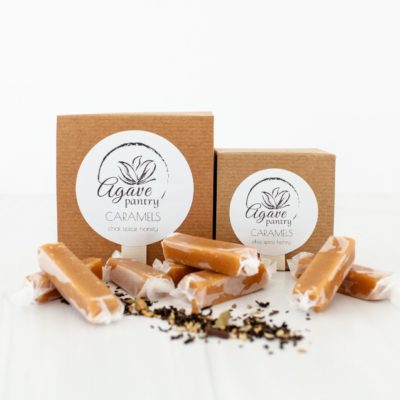
Having grown up in Karachi, Pakistan (a city of over 14 million people), Shazieh Gorji missed the spontaneity of the community she knew so well as a child. “People would just show up at your house,” she said, “whether you liked it or not!” Shazieh moved to Tucson in 2012 and appreciated the “space” that one has here, but often felt isolated. She was looking for how to find a balance between the two (aren’t we all?!) Fortunately, she found community through Tucson CSA when she joined in April of 2019 – shortly before so much would shift due to the pandemic. She has appreciated “feeling part of something” through the CSA throughout it all.
As an artist (translation: potter, baker, ritual-maker), Shazieh knows what it means to be innovative and deal with change. She has been honing her skills in pottery, baking, and day to day ritual-making for over fifteen years. Agave Pantry is her pop up shop and custom order artisan bakery dedicated to using organic, non-gmo and pure ingredients. She is genuinely committed to ethically sourcing organic herbs and spices, and the quality and care shine through all of her creations.
Agave Pantry offers handcrafted baked goods, pottery, infused salts, and spice blends along with ceremonial items influenced by daily life in the Southwest. Quality ingredients blended, baked, and fired with care, these creations evoke the desire to slow down, take a moment and enjoy simple pleasures.
At Tucson CSA we are incredibly fortunate to offer one of her most delightful creations: hand-crafted caramels. As it goes, they are something that she never would have thought of making without collaborative inspiration. As Shazieh said, “I may be a one person show, but we all thrive off one another’s creative influences.” When she was asked to contribute something with a “honey lavender” theme to one such artistic collaboration, creamy caramels became the delicious result. This innovation has helped her to experiment with different flavor profiles.
Starting this week, you can find her hand-crafted caramels at The CSA Shop in an assortment box (½ dozen or dozen) of Chai Spice and Lavender Honey. Shazieh uses local wild honey, organic cane sugar – never corn syrup – and all other organic ingredients. She makes her own blend of spices for the Chai and sources the fair-trade herbs and spices she incorporates into her creations from Mountain Rose Herbs.
The caramels will store fine at room temperature for up to 2 weeks, and for a few months in the fridge. If they make it long enough to go in the fridge, she suggests putting them in an airtight bag or container to keep out any other potential smells (i.e. garlic, kimchi). Buy them now and they will be fine until your end of year holiday celebrations. They are nice paired with cheese boards or dessert trays, or enjoyed on their own. These are NOT toffee, and so they do not get stuck in your teeth – a primary reason that Shazieh says her elderly clients like them so much.
“You cannot keep doing what you love to do if no one is buying,” Shazieh says. We all hope you will want to buy them and taste some of that love in there!
Keep posted for more information about her chai and flavored salt gift sets, ceramics/pottery and amaretti cookies at an upcoming Holiday Pop-Up Market at the CSA.
Even though it is “another thing to do”, Shazieh values coming to pick up her share for the experience of community that she, and her 8 year old son, has each week. “It is such a great feeling to walk in and see people,” she said, “and have my son see the vegetables and understand where they are coming from.” After walking out carrying a small watermelon last week, Shazieh’s son asked his mom if he could work for Tucson CSA someday. Wonderfully surprised, Shazieh said she would love that, and so would we! Going to the CSA has become a ritual for her son as well, and she hopes that one day he may even eat the vegetables, too!
Save the Date
Tucson CSA Pop-Up Market #1
Tuesday, Nov 30th & Wednesday, December 1st
Sonoran Soaps and Sundries will offer handmade soaps, salves, hydrosols and remedies based on plant infusions
Tucson CSA Pop-Up Market #2
Tuesday, Dec. 7th & Wednesday, Dec. 8th
Agave Pantry will have chai tea and flavored salt gift sets, ceramics/pottery and amaretti cookies!
Tucson CSA Pop-Up Market #3
Tuesday, Dec. 14th & Wednesday, Dec. 15th
Laurel’s Florals will have a variety of wreaths and creative decorations for your holiday table, door and/or gifts
A Personal Story About Epic Chocolates
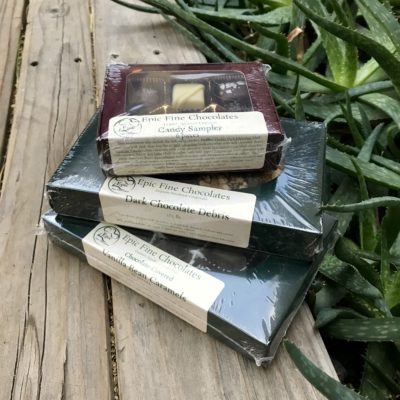
It was in 2005 that I found and joined the Tucson CSA. It was a revelation: the food was so fresh, it stayed alive in my refrigerator as long as my own homegrown produce. There were other foods to buy, such as Josh’s eggs and goat cheese from Black Mesa Ranch. When I went to the Black Mesa Ranch website, there were pictures of goats living their best lives in Snowflake Arizona. There was no goat cheese subscription in the Spring, as the goat milk was needed for the new baby goats born at that time.
As good as the goat cheese was, it was very clear that the rancher, David, was truly a confisateur at heart. Forgive the French term, but it is necessary to emphasize that this was David’s true calling; the place where his passion lay. Come November, when the goat milk was at its richest, he crafted the most exquisite caramels, truffles, fudge and chocolate bark—made with the finest Belgian chocolate, it rivaled the sweets I’d had in Europe. It was incredibly reasonably priced, because, as David said, he wanted the people of his community in Snowflake to be able to afford it.
I always bought it at the CSA when it was available and put it aside for that time when I had a house full of holiday family and friends. The chocolates were in an unassuming simple green box, which I would quietly put out in the living room after a big dinner where I’d had 8-12 guests. There were never any left the next morning. And people would ask me, “what were those chocolates we ate last night, and where did they come from?” When someone follows their passion, the result is always supreme.
Now Black Mesa Ranch is no more; they no longer raise goats. Fortunately, we at the CSA are able to get wonderful goat cheese from Fiore di Capra now. And we still get to benefit from David’s passion for candy. He now obtains his products from sources that aren’t typically local; as the Belgium chocolate never was. While it is no longer milk from his goats, it is still local goat milk, and it is still outstanding. I admire David for following his passion, and am glad we still have access to his superb chocolate creations, now sold as Epic Fine Chocolates.
You will find a variety of his creations at the Tucson CSA in The Shop from now through the holiday season. The fudge does source goat milk locally; and the Tortoises utilize Arizona pecans. They make great gifts and party contributions…if you can get them to last that long!
By Lorraine Glazar, CSA member

Oatman Farm – White Sonora Wheat Berries
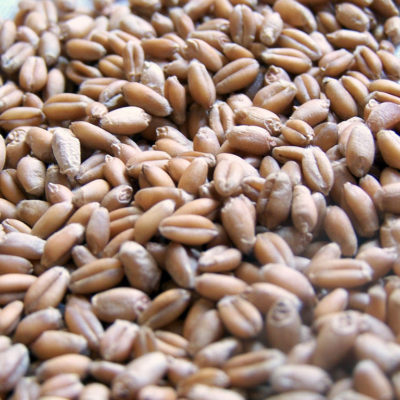
Back in the summer of 2007 we puzzled over our first ever share of Wheat Berries. Grown as an experiment by Crooked Sky Farmer Frank Martin, the whole wheat grains that are the mother grain from which pasta, bread, and flour are derived, were unfamiliar to most of us. We mulled through recipes and exchanged ideas and cooking tips and many of us came to love the hearty, nutlike flavor and pleasantly chewy texture of the cooked wheat berries. We enjoyed getting the wheat berries in our shares for several years, until a combination of factors made it too difficult for Frank to continue grow the crop. Now, 15 years after they first appeared in our CSA shares, regionally adapted wheat varieties are making a comeback across the country and we wanted to reintroduce our members to the pleasures of this local food. We are excited to be working with Oatman Flats Ranch to source these once-widespread heritage wheats, like White Sonora, for our CSA shares. Oatman Flats Ranch is the largest organic wheat farmer in Arizona and one of the first large-scale Organic Regenerative wheat growers in the United States. They utilize organic and regenerative* farming practices to grow heritage and modern wheat and other crops; each selected to be flavorful, nutrient dense, and suitable for the desert climate.
Since wheat berries are a whole, unprocessed grain, they are a healthy alternative to white rice or pasta. They are relatively high in fiber, iron and protein plus contain a healthy amount of many vitamins and minerals. The Sonoran White wheat berries in our shares are a soft winter wheat, containing less gluten than hard wheat varieties. They have a a pleasant light wheat aroma with a delicate, creamy wheat flavor. With Tucson’s designation as a City of Gastronomy, this variety of wheat has become a bit of a celebrity in our region and can be found in tortillas, bread and beers across the city. Even so, finding recipes online for Sonoran White wheat berries can be tricky. We have a number of our favorite recipes in our archives and you can also try searching for ‘farro’ recipes instead of wheat berries. They are essentially the same thing but the term farro is used more often in cooking blogs, magazines and cookbooks.
*Regenerative agriculture is a conservation and rehabilitation approach to food and farming systems. It focuses on topsoil regeneration, increasing biodiversity, improving the water cycle, enhancing ecosystem services, supporting bio sequestration, increasing resilience to climate change, and strengthening the health and vitality of farm soil.
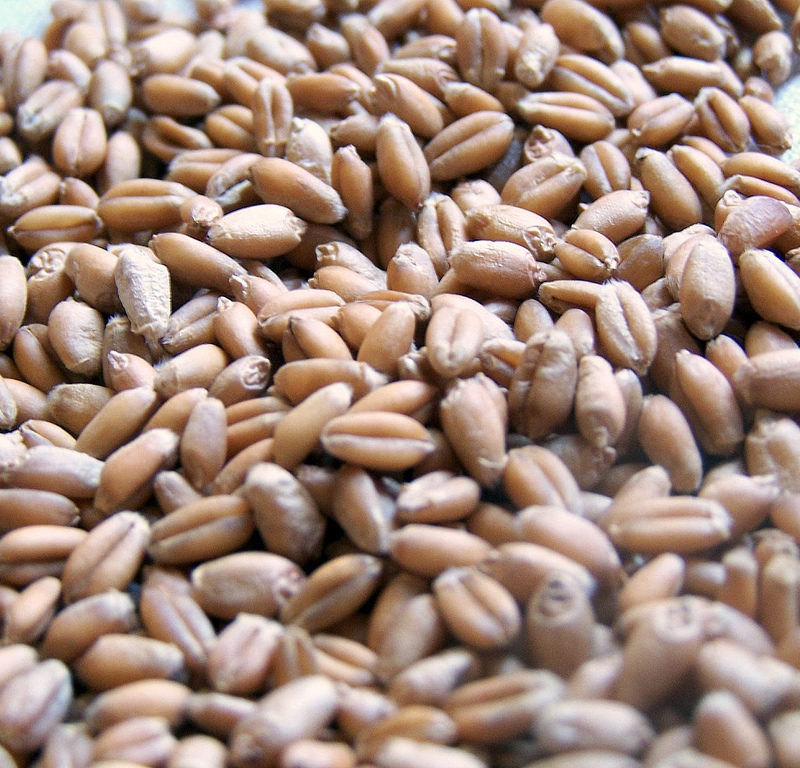
We’re Reading
TASTE: My Life Through Food, by Stanley Tucci Your local library or book storeWe’re Listening To
Point of Origin Podcast iHeartPODCAST NetworkWe’re Watching
Farming for Food Sovereignty Good Food FinderWe’re Reading
A mega-dairy is transforming Arizona’s aquifer and farming lifestyles High Country News